| Listing 1 - 10 of 23 | << page >> |
Sort by
|
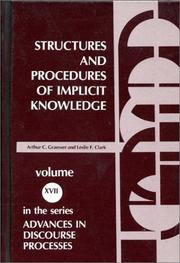
ISBN: 0893913626 Year: 1985 Volume: 17 Publisher: Norwood Ablex
Abstract | Keywords | Export | Availability | Bookmark
 Loading...
Loading...Choose an application
- Reference Manager
- EndNote
- RefWorks (Direct export to RefWorks)
Theory of knowledge --- Knowledge, Theory of --- Cognition --- 681.3*I24 --- 681.3*I27 --- Knowledge representation formalisms and methods: frames and scripts; predicate logic; relation systems; representation languages; procedural and rule-based representations; semantic networks (Artificial intelligence) --- Natural language processing: language generation; language models; language parsing and understanding; machine translation; speech recognition and under-standing; text analysis (Artificial intelligence) --- 681.3*I27 Natural language processing: language generation; language models; language parsing and understanding; machine translation; speech recognition and under-standing; text analysis (Artificial intelligence) --- 681.3*I24 Knowledge representation formalisms and methods: frames and scripts; predicate logic; relation systems; representation languages; procedural and rule-based representations; semantic networks (Artificial intelligence) --- Epistemology --- Philosophy --- Psychology
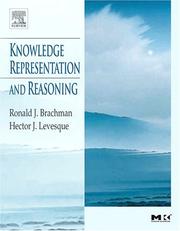
ISBN: 1558609326 9781558609327 1493303791 9786611049317 128104931X 008048932X 9780080489322 9781281049315 9781493303793 Year: 2004 Publisher: Amsterdam ; Boston : Morgan Kaufmann,
Abstract | Keywords | Export | Availability | Bookmark
 Loading...
Loading...Choose an application
- Reference Manager
- EndNote
- RefWorks (Direct export to RefWorks)
Knowledge representation is at the very core of a radical idea for understanding intelligence. Instead of trying to understand or build brains from the bottom up, its goal is to understand and build intelligent behavior from the top down, putting the focus on what an agent needs to know in order to behave intelligently, how this knowledge can be represented symbolically, and how automated reasoning procedures can make this knowledge available as needed. This landmark text takes the central concepts of knowledge representation developed over the last 50 years and illustrates them in a l
Knowledge representation (Information theory) --- Reasoning --- Knowledge representation (Information theory). --- Reasoning. --- 681.3*I24 --- 681.3*I24 Knowledge representation formalisms and methods: frames and scripts; predicate logic; relation systems; representation languages; procedural and rule-based representations; semantic networks (Artificial intelligence) --- Knowledge representation formalisms and methods: frames and scripts; predicate logic; relation systems; representation languages; procedural and rule-based representations; semantic networks (Artificial intelligence) --- Représentation des connaissances --- Raisonnement --- Argumentation --- Ratiocination --- Reason --- Thought and thinking --- Judgment (Logic) --- Logic --- Representation of knowledge (Information theory) --- Artificial intelligence --- Information theory --- informatiemanagement
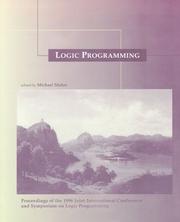
ISSN: 10610464 ISBN: 0262631733 9780262291309 9780262631730 0262291304 Year: 1996 Publisher: Cambridge, Mass. ; London : MIT,
Abstract | Keywords | Export | Availability | Bookmark
 Loading...
Loading...Choose an application
- Reference Manager
- EndNote
- RefWorks (Direct export to RefWorks)
September 2-6, 1996, Bonn, Germany Every four years, the two major international scientific conferences on logic programming merge in one joint event. JICSLP'96 is the thirteenth in the two series of annual conferences sponsored by The Association for Logic Programming. It includes tutorials, invited lectures, and refereed papers on all aspects of logic programming including: Constraints, Concurrency and Parallelism, Deductive Databases, Implementations, Meta and Higher-order Programming, Theory, and Semantic Analysis. The contributors are international, with strong contingents from the United States, United Kingdom, France, and Japan. Logic Programming series, Research Reports and Notes.
681.3*F1 --- 681.3*I23 Deduction and theorem proving: answer/reason extraction; reasoning; resolution; metatheory; mathematical induction; logic programming (Artificial intelligence) --- Deduction and theorem proving: answer/reason extraction; reasoning; resolution; metatheory; mathematical induction; logic programming (Artificial intelligence) --- 681.3*I24 <063> Knowledge representation formalisms and methods: frames and scripts; predicate logic; relation systems; representation languages; procedural and rule-based representations; semantic networks (Artificial intelligence)--Congressen --- Knowledge representation formalisms and methods: frames and scripts; predicate logic; relation systems; representation languages; procedural and rule-based representations; semantic networks (Artificial intelligence)--Congressen --- 681.3*F1 Computation by abstract devices --- Computation by abstract devices --- Logic programming --- Logic programming - Congresses --- COMPUTER SCIENCE/Programming Languages
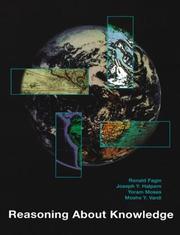
ISBN: 0262256096 9780262256094 9780262562003 0262562006 Year: 2003 Publisher: Cambridge, Mass. MIT Press
Abstract | Keywords | Export | Availability | Bookmark
 Loading...
Loading...Choose an application
- Reference Manager
- EndNote
- RefWorks (Direct export to RefWorks)
Reasoning about knowledge--particularly the knowledge of agents who reason about the world and each other's knowledge--was once the exclusive province of philosophers and puzzle solvers. More recently, this type of reasoning has been shown to play a key role in a surprising number of contexts, from understanding conversations to the analysis of distributed computer algorithms.Reasoning About Knowledge is the first book to provide a general discussion of approaches to reasoning about knowledge and its applications to distributed systems, artificial intelligence, and game theory. It brings eight years of work by the authors into a cohesive framework for understanding and analyzing reasoning about knowledge that is intuitive, mathematically well founded, useful in practice, and widely applicable. The book is almost completely self-contained and should be accessible to readers in a variety of disciplines, including computer science, artificial intelligence, linguistics, philosophy, cognitive science, and game theory. Each chapter includes exercises and bibliographic notes.
Philosophy --- Philosophy & Religion --- Speculative Philosophy --- Knowledge, Theory of --- Agent (Philosophy) --- Reasoning --- Argumentation --- Ratiocination --- Agency (Philosophy) --- Agents --- Person (Philosophy) --- Epistemology --- Theory of knowledge --- Reason --- Thought and thinking --- Judgment (Logic) --- Logic --- Act (Philosophy) --- Psychology --- Knowledge, Theory of. --- Reasoning. --- COMPUTER SCIENCE/General --- 681.3*I24 --- 681.3*I24 Knowledge representation formalisms and methods: frames and scripts; predicate logic; relation systems; representation languages; procedural and rule-based representations; semantic networks (Artificial intelligence) --- Knowledge representation formalisms and methods: frames and scripts; predicate logic; relation systems; representation languages; procedural and rule-based representations; semantic networks (Artificial intelligence)
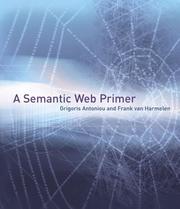
ISBN: 0262012103 Year: 2004 Publisher: Cambridge (Mass.) MIT press
Abstract | Keywords | Export | Availability | Bookmark
 Loading...
Loading...Choose an application
- Reference Manager
- EndNote
- RefWorks (Direct export to RefWorks)
Computer architecture. Operating systems --- Semantic Web --- Web sémantique --- Semantic web --- 681.3*C --- 681.3*I24 --- 681.3*H25 --- Semantic integration (Computer systems) --- Semantic networks (Information theory) --- World Wide Web --- Microformats --- Computer systems organization: hardware/software interfaces; instruction set design; system architectures; systems specification methodology --- Knowledge representation formalisms and methods: frames and scripts; predicate logic; relation systems; representation languages; procedural and rule-based representations; semantic networks (Artificial intelligence) --- Heterogeneous databases: data translation; program translation (Database management) --- Semantic Web. --- 681.3*H25 Heterogeneous databases: data translation; program translation (Database management) --- 681.3*I24 Knowledge representation formalisms and methods: frames and scripts; predicate logic; relation systems; representation languages; procedural and rule-based representations; semantic networks (Artificial intelligence) --- 681.3*C Computer systems organization: hardware/software interfaces; instruction set design; system architectures; systems specification methodology --- Web sémantique
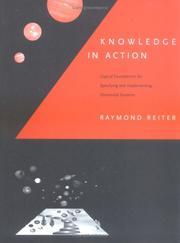
ISBN: 0262182181 0262527006 0262282313 0585448302 0262264315 9780262282314 9780585448305 9780262182188 9780262527002 Year: 2001 Publisher: Cambridge : MIT Press,
Abstract | Keywords | Export | Availability | Bookmark
 Loading...
Loading...Choose an application
- Reference Manager
- EndNote
- RefWorks (Direct export to RefWorks)
Modeling and implementing dynamical systems is a central problem in artificial intelligence, robotics, software agents, simulation, decision and control theory, and many other disciplines. In recent years, a new approach to representing such systems, grounded in mathematical logic, has been developed within the AI knowledge-representation community. This book presents a comprehensive treatment of these ideas, basing its theoretical and implementation foundations on the situation calculus, a dialect of first-order logic. Within this framework, it develops many features of dynamical systems modeling, including time, processes, concurrency, exogenous events, reactivity, sensing and knowledge, probabilistic uncertainty, and decision theory. It also describes and implements a new family of high-level programming languages suitable for writing control programs for dynamical systems. Finally, it includes situation calculus specifications for a wide range of examples drawn from cognitive robotics, planning, simulation, databases, and decision theory, together with all the implementation code for these examples. This code is available on the book's Web site.
Knowledge representation (Information theory) --- Expert systems (Computer science) --- Logic, Symbolic and mathematical --- Représentation des connaissances --- Systèmes experts (Informatique) --- Logique symbolique et mathématique --- Systèmes experts (informatique) --- Logique mathématique --- Logic, Symbolic and mathematical. --- 681.3*I24 --- Algebra of logic --- Logic, Universal --- Mathematical logic --- Symbolic and mathematical logic --- Symbolic logic --- Mathematics --- Algebra, Abstract --- Metamathematics --- Set theory --- Syllogism --- Knowledge-based systems (Computer science) --- Systems, Expert (Computer science) --- Artificial intelligence --- Computer systems --- Soft computing --- Representation of knowledge (Information theory) --- Information theory --- Knowledge representation formalisms and methods: frames and scripts; predicate logic; relation systems; representation languages; procedural and rule-based representations; semantic networks (Artificial intelligence) --- Engineering & Applied Sciences --- Computer Science --- 681.3*I24 Knowledge representation formalisms and methods: frames and scripts; predicate logic; relation systems; representation languages; procedural and rule-based representations; semantic networks (Artificial intelligence) --- Représentation des connaissances. --- Logique mathématique. --- COMPUTER SCIENCE/Artificial Intelligence
Book
ISBN: 020156341X 9780201563412 Year: 1995 Publisher: Reading (Mass.): Addison-Wesley
Abstract | Keywords | Export | Availability | Bookmark
 Loading...
Loading...Choose an application
- Reference Manager
- EndNote
- RefWorks (Direct export to RefWorks)
Object-oriented databases --- 681.3*H2 --- 681.3*D1 --- 681.3*H4 --- 681.3*I24 --- Object-oriented data bases --- Databases --- Object-oriented methods (Computer science) --- Database management: security; integrity; protection--See also {?681.5*E5} --- Programming techniques--See also {681.3*E} --- Information systems applications (GIS etc.) --- Knowledge representation formalisms and methods: frames and scripts; predicate logic; relation systems; representation languages; procedural and rule-based representations; semantic networks (Artificial intelligence) --- 681.3*I24 Knowledge representation formalisms and methods: frames and scripts; predicate logic; relation systems; representation languages; procedural and rule-based representations; semantic networks (Artificial intelligence) --- 681.3*H4 Information systems applications (GIS etc.) --- 681.3*D1 Programming techniques--See also {681.3*E} --- 681.3*H2 Database management: security; integrity; protection--See also {?681.5*E5}
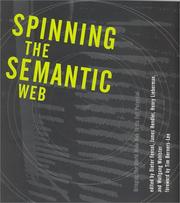
ISBN: 0262062321 Year: 2003 Publisher: Cambridge (Mass.) : MIT Press,
Abstract | Keywords | Export | Availability | Bookmark
 Loading...
Loading...Choose an application
- Reference Manager
- EndNote
- RefWorks (Direct export to RefWorks)
681.3*Internet --- 621.39* --- 021.63 --- 025.4 --- 681.3*I24 --- 681.3*H25 --- Computerwetenschap--*--Internet --- Internet --- Bibliotheeksystemen. Bibliotheeknetten. Centralisatie --- Ontsluitings- en terugzoektalen. Classificaties. Thesauri. Metadata voor information retrieval --- Knowledge representation formalisms and methods: frames and scripts; predicate logic; relation systems; representation languages; procedural and rule-based representations; semantic networks (Artificial intelligence) --- Heterogeneous databases: data translation; program translation (Database management) --- Semantic Web. --- World Wide Web. --- 681.3*H25 Heterogeneous databases: data translation; program translation (Database management) --- 681.3*I24 Knowledge representation formalisms and methods: frames and scripts; predicate logic; relation systems; representation languages; procedural and rule-based representations; semantic networks (Artificial intelligence) --- 025.4 Ontsluitings- en terugzoektalen. Classificaties. Thesauri. Metadata voor information retrieval --- 021.63 Bibliotheeksystemen. Bibliotheeknetten. Centralisatie --- 621.39* Internet --- Semantic Web --- World Wide Web --- W3 (World Wide Web) --- Web (World Wide Web) --- World Wide Web (Information retrieval system) --- WWW (World Wide Web) --- Hypertext systems --- Multimedia systems --- Semantic integration (Computer systems) --- Semantic networks (Information theory) --- Microformats
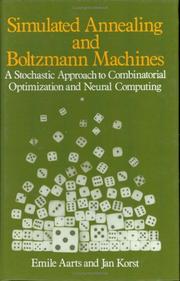
ISBN: 0471921467 9780471921462 Year: 1989 Publisher: New York, NY ; Chichester : John Wiley,
Abstract | Keywords | Export | Availability | Bookmark
 Loading...
Loading...Choose an application
- Reference Manager
- EndNote
- RefWorks (Direct export to RefWorks)
Simulated annealing (Mathematics) --- Machine theory --- Neural computers. --- 681.3*C12 --- 681.3*I24 --- 681.3*I24 Knowledge representation formalisms and methods: frames and scripts predicate logic relation systems representation languages procedural and rule-based representations semantic networks (Artificial intelligence) --- Knowledge representation formalisms and methods: frames and scripts predicate logic relation systems representation languages procedural and rule-based representations semantic networks (Artificial intelligence) --- 681.3*C12 Multiple data stream architectures (multiprocessors): MIMD SIMD pipeline and parallel processors array-, vector-, associative processors interconnection architectures: common bus, multiport memory, crossbar switch --- Multiple data stream architectures (multiprocessors): MIMD SIMD pipeline and parallel processors array-, vector-, associative processors interconnection architectures: common bus, multiport memory, crossbar switch --- Neural net computers --- Neural network computers --- Neurocomputers --- Electronic digital computers --- Natural computation --- Artificial intelligence --- Abstract automata --- Abstract machines --- Automata --- Mathematical machine theory --- Algorithms --- Logic, Symbolic and mathematical --- Recursive functions --- Robotics --- Algorithm, Annealing --- Algorithm, Probabilistic exchange --- Annealing, Monte Carlo --- Annealing, Simulated --- Annealing algorithm --- Cooling, Statistical --- Exchange algorithm, Probabilistic --- Hill climbing, Probabilistic --- Monte Carlo annealing --- Probabilistic exchange algorithm --- Probabilistic hill climbing --- Relaxation, Stochastic --- Statistical cooling --- Stochastic relaxation --- Combinatorial optimization --- Numerical methods of optimisation --- Machine theory. --- Automates mathématiques, Théorie des --- Ordinateurs neuronaux --- #TELE:ACCA --- Automates mathématiques, Théorie des --- Neural computers --- 681.3*I24 Knowledge representation formalisms and methods: frames and scripts; predicate logic; relation systems; representation languages; procedural and rule-based representations; semantic networks (Artificial intelligence) --- Knowledge representation formalisms and methods: frames and scripts; predicate logic; relation systems; representation languages; procedural and rule-based representations; semantic networks (Artificial intelligence) --- 681.3*C12 Multiple data stream architectures (multiprocessors): MIMD; SIMD; pipeline and parallel processors; array-, vector-, associative processors; interconnection architectures: common bus, multiport memory, crossbar switch --- Multiple data stream architectures (multiprocessors): MIMD; SIMD; pipeline and parallel processors; array-, vector-, associative processors; interconnection architectures: common bus, multiport memory, crossbar switch --- Combinatorial optimization. --- Optimisation combinatoire. --- Automates mathématiques, Théorie des. --- Ordinateurs neuronaux. --- Recuit simulé (mathématiques)
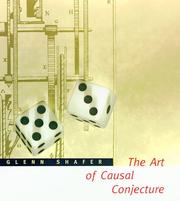
ISBN: 026219368X 9780262290999 9780262193689 0262290995 Year: 1996 Publisher: Cambridge, Mass. : MIT Press,
Abstract | Keywords | Export | Availability | Bookmark
 Loading...
Loading...Choose an application
- Reference Manager
- EndNote
- RefWorks (Direct export to RefWorks)
"In The Art of Causal Conjecture, Glenn Shafer lays out a new mathematical and philosophical foundation for probability and uses it to explain concepts of causality used in statistics, artificial intelligence, and philosophy.The various disciplines that use causal reasoning differ in the relative weight they put on security and precision of knowledge as opposed to timeliness of action. The natural and social sciences seek high levels of certainty in the identification of causes and high levels of precision in the measurement of their effects. The practical sciences--medicine, business, engineering, and artificial intelligence--must act on causal conjectures based on more limited knowledge. Shafer's understanding of causality contributes to both of these uses of causal reasoning. His language for causal explanation can guide statistical investigation in the natural and social sciences, and it can also be used to formulate assumptions of causal uniformity needed for decision making in the practical sciences.Causal ideas permeate the use of probability and statistics in all branches of industry, commerce, government, and science. The Art of Causal Conjecture shows that causal ideas can be equally important in theory. It does not challenge the maxim that causation cannot be proven from statistics alone, but by bringing causal ideas into the foundations of probability, it allows causal conjectures to be more clearly quantified, debated, and confronted by statistical evidence."
Artificial intelligence. Robotics. Simulation. Graphics --- Mathematical logic --- Artificial intelligence. --- Causation. --- Prediction (Logic) --- Probabilities. --- 681.3*I24 --- 681.3*F41 --- Probability --- Statistical inference --- Combinations --- Mathematics --- Chance --- Least squares --- Mathematical statistics --- Risk --- Conjecture --- Judgment (Logic) --- Causality --- Cause and effect --- Effect and cause --- Final cause --- Beginning --- God --- Metaphysics --- Philosophy --- Necessity (Philosophy) --- Teleology --- AI (Artificial intelligence) --- Artificial thinking --- Electronic brains --- Intellectronics --- Intelligence, Artificial --- Intelligent machines --- Machine intelligence --- Thinking, Artificial --- Bionics --- Cognitive science --- Digital computer simulation --- Electronic data processing --- Logic machines --- Machine theory --- Self-organizing systems --- Simulation methods --- Fifth generation computers --- Neural computers --- Knowledge representation formalisms and methods: frames and scripts; predicate logic; relation systems; representation languages; procedural and rule-based representations; semantic networks (Artificial intelligence) --- Mathematical logic: computability theory; computational logic; lambda calculus; logic programming; mechanical theorem proving; model theory; proof theory;recursive function theory--See also {681.3*F11}; {681.3*I22}; {681.3*I23} --- 681.3*F41 Mathematical logic: computability theory; computational logic; lambda calculus; logic programming; mechanical theorem proving; model theory; proof theory;recursive function theory--See also {681.3*F11}; {681.3*I22}; {681.3*I23} --- 681.3*I24 Knowledge representation formalisms and methods: frames and scripts; predicate logic; relation systems; representation languages; procedural and rule-based representations; semantic networks (Artificial intelligence) --- Prediction (Logic). --- Artificial intelligence --- Causation --- Probabilities --- COMPUTER SCIENCE/General
| Listing 1 - 10 of 23 | << page >> |
Sort by
|

 Search
Search Feedback
Feedback About
About Help
Help News
News